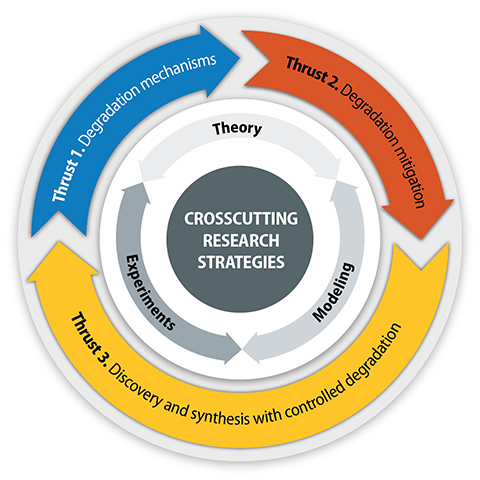Research

DEGREES' crosscutting research focuses on scientific thrusts that will integrate strategies to mitigate and control thermal energy storage material (TESM) degradation for clean electricity production technologies.
Through an iterative process, these scientific thrusts will enable the development of more durable and resilient TESMs—particularly phase change materials (PCMs) and thermochemical materials (TCMs)—for long-duration energy storage.
Scientific Thrust 1: Degradation Mechanisms of Complex Heterogeneous Phase Change Materials and Thermochemical Materials
Scientific Thrust 1 aims to establish a comprehensive understanding of critical degradation mechanisms of PCMs and TCMs appropriate for electrothermal energy storage. It will identify a set of fundamental degradation mechanisms that occur because of physical, chemical, and mechanical changes inherent to material operations and interactions between thermal energy storage media and containment materials.
Scientific Thrust 2: Degradation Mitigation Through Thermodynamic and Kinetic Control
Executed in parallel with the first thrust, Scientific Thrust 2 strives to develop effective mitigation approaches to either stop or slow down the degradation or reverse the damage. It will implement self-controlled approaches—those that regenerate TESMs thermal properties once degradation starts—to avoid the damage on thermal performance.
Scientific Thrust 3: Discovery and Synthesis of Functionalized Phase Change Materials and Thermochemical Materials With Controlled Degradation
With fundamental knowledge from Scientific Thrusts 1 and 2, Scientific Thrust 3 will co-design, synthesize, and characterize functionalized high-energy and power-density PCMs and TCMs with little to no degradation impact on their thermal properties and performance.
Share
Last Updated April 3, 2025
